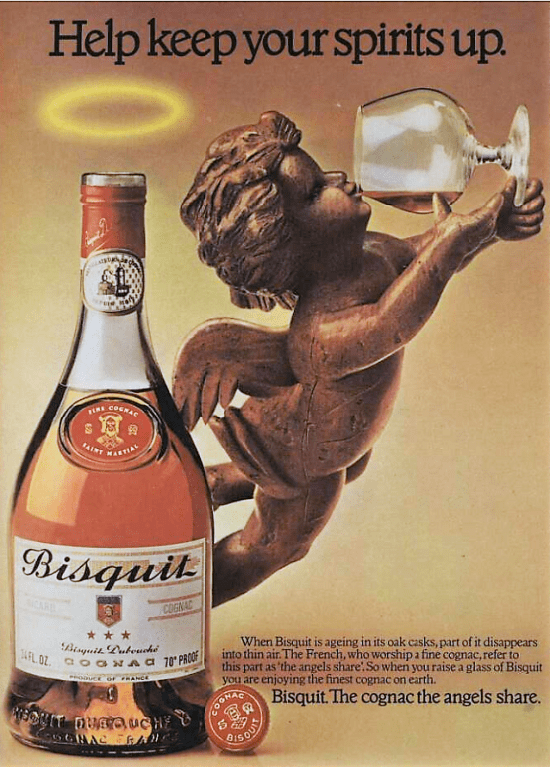The phrase the angels’ share denotes:
– the quantity of distilled spirits lost to evaporation while ageing in wooden casks;
– the vapours resulting from this process.
It is a loan translation from French la part des anges*—although I have found no occurrence of the French phrase predating the angels’ share.
(* Similarly, the lion’s share corresponds to the French expression la part du lion.)
It seems that la part des anges is simply a poetic image, and that there is no need to invoke—as some people do—an alchemical reference to volatile substances.
Originally, the angels’ share related specifically to cognac, a high-quality brandy distilled from wine in the area of Cognac, a town in the department of Charente, in western France.
The earliest occurrence of the angels’ share that I have found denotes the quantity of spirits lost to evaporation and is from Drink fit for angels, by Peta Fordham, published in The Illustrated London News (London, England) of Saturday 14th March 1970:
I was staying with the Martells, a house whose connection with cognac (both small and large C’s) goes back to 1715. It is always something of a surprise to be reminded of the differing characteristics of the cognac houses, whose individual blendings carry the same aroma right through their range; and none more so than Martell. One figure illustrates consistency as well as any: the evaporation each year of the maturing brandy (the “Angels’ Share”, as it is known) equals 1,200,000 bottles. The average stock of which the consistency is guaranteed is 40 million bottles. It inspires respect.
The second-earliest occurrence that I have found has the same signification and is from Cognac Connoisseur: Taste Buds With Expertise, by Barbara Hansen, published in the Los Angeles Times (Los Angeles, California, USA) of Thursday 11th June 1970—Jacques Hine is “a director of his family’s cognac firm”:
Cognacs lose some of their alcohol through evaporation while in the cask and are cut with water to bring them to the proper proof for bottling. “We are allowed 5% evaporation a year,” Hine said. In France this is known as “the angel’s [sic] share.”
From October 1970 to December 1971, in the Belfast Telegraph (Belfast, County Antrim, Northern Ireland), an advertising campaign for Bisquit used the phrase punningly—the first advertisement was as follows on Friday 2nd October 1970:
Heaven knows where 3% of our Bisquit goes each year.
One of the rewards of heaven is free Bisquit Cognac. It works like this.
Every year we give up a steady 3% of our Bisquit, due to evaporation from the oak casks in which our cognac matures.
The French call this “the angels’ share”.
But you’re one up on them. Because the part that doesn’t evaporate is bottled, and that’s the best part.
Any good wine merchant or pub will have Bisquit Cognac.BISQUIT
The cognac the angels share.
Advertisements for Bisquit also appeared in The Illustrated London News (London, England) from October to December 1972—this one was published in the October issue:
Help keep your spirits up
When Bisquit is ageing in its oak casks, part of it disappears into thin air. The French, who worship a fine cognac, refer to this part as ‘the angels [sic] share’. So when you raise a glass of Bisquit you are enjoying the finest cognac on earth.
Bisquit. The cognac the angels share.
In A perfect marriage, published in The Illustrated London News (London, England) of February 1974, Peta Fordham, writing about the Martell dynasty, used the angels’ share in the sense of the vapours resulting from evaporation:
There at the distillery, in the ancient town of Cognac, amid roofs blackened with the lichen which grows only where the fumes of the “angels’ share” of cognac leaks [sic] from the maturing casks (1,200,000 bottles a year from Martell alone), you can taste cognacs distilled in 1830 and 1848 (bottled long since, for cognac becomes undrinkable after about 60 years) and detect unmistakable Martell.

